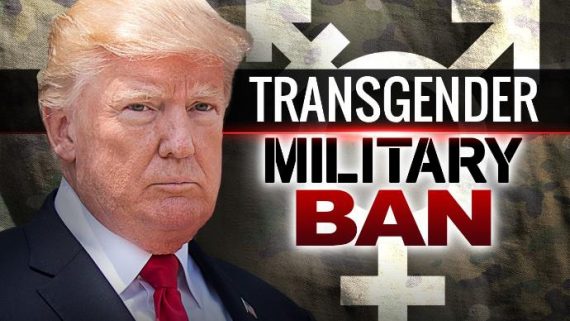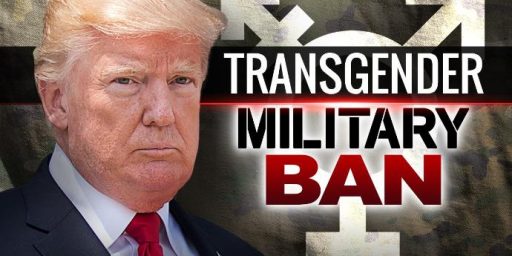Pursuant To Court Order, Defense Department Will Allow Transgender Americans To Enlist
Transgender Americans will be able to enlist in the military beginning January 1st thanks to a ruling from a Federal District Court Judge.
Pursuant to an order issued yesterday by a Federal District Court Judge presiding over one of the lawsuits against Donald Trump’s purported ban on transgender Americans serving in the military, the Pentagon will begin allowing openly transgender Americans to enlist in the military beginning on January 1st:
WASHINGTON — Transgender people will be allowed to enlist in the military beginning Jan. 1, Defense Department officials said on Monday, a move that pauses President Trump’s effort to bar transgender troops.
A federal judge allowed an October order pausing the ban to remain in effect, pending further legal review. The judge, Colleen Kollar-Kotelly of the Federal District Court in Washington, said in a ruling on Monday that the ban most likely violates constitutional rights to due process and equal protection.
She rejected the Trump administration’s argument that it needs more time to prepare to process new transgender recruits for military service.
“The court is not persuaded that defendants will be irreparably injured by allowing the accession of transgender individuals into the military beginning on Jan. 1, 2018,” she wrote.
Sarah Huckabee Sanders, the White House press secretary, suggested that Mr. Trump would continue to seek ways to carry out his ban. “The Department of Justice is currently reviewing the legal options to ensure the president’s directive is implemented,” she told reporters.
A Defense Department official said its move was partly a result of a barrage of lawsuits filed after Mr. Trump announced that he was barring transgender people from serving in the military. Later on Monday, and separately, a federal judge in Seattle also ordered a halt to the ban on transgender people serving in the military.
Mr. Trump announced the ban in a series of tweets in July. He said then that he had decided to do so after consulting with generals and military experts, although Defense Secretary Jim Mattis was given only a day’s notice.
Advocates for allowing transgender people in the military said they were not yet ready to declare victory.
“What the ruling signals is that both the Pentagon and the courts have recognized that Trump was stepping out of his lane when he tweeted,” said Aaron Belkin, the director of the Palm Center, which advocates on behalf of the transgender community in the military.
But, he added: “This could be a long process. We just don’t know what happens next.”
Since Mr. Trump gave the order, the Pentagon has slow-walked it, telling transgender members of the military that they could continue to serve openly while the Pentagon decided how to handle the ban. Last month, the Pentagon paid for gender-reassignment surgery for an active-duty military member.
Staff Sgt. Ashlee Bruce of the Air Force, who began her transition this year, said young transgender troops like her have been on edge in recent months, but noted that even after Mr. Trump announced all transgender troops would be discharged, her commanders and the medical team overseeing her transition continued to reassure her. They cleared the way for her to begin hormone treatments and have her name changed before she leaves for an assignment in South Korea in March.
“Everyone in the leadership kept saying it would be O.K.; they never wavered,” she said. Though she still has to wear a man’s uniform at work, she appeared in a dress for the first time at her squadron’s holiday party last week, with the support of her command.
“It was the first time I could show who I really was, and everyone was so great about it,” she said.
In announcing his ban, Mr. Trump tweeted that American forces could not afford the “tremendous medical costs and disruption” of transgender service members. But the RAND Corporation, in a 2016 study, found that allowing transgender people to serve openly in the military would “have minimal impact on readiness and health care costs” for the Pentagon.
It estimated that health care costs would rise $2.4 million, to $8.4 million annually, representing an infinitesimal 0.04 to 0.13 percent increase in spending. Citing research into other countries that allow transgender people to serve, the study projected “little or no impact on unit cohesion, operational effectiveness or readiness” in the United States.
In temporarily blocking the ban in October, Judge Kollar-Kotelly said that the administration’s justification for it was suspect and probably unconstitutional.
Defense Department officials said that new guidelines, a reinstatement of President Barack Obama’s opening of the military to transgender recruits, first reported by The Associated Press, mean that new recruits will have to undergo medical tests before enlisting.
This ruling and the policy announcement by the Defense Department comes also comes just about five months after President Trump announced on Twitter that he was reversing the Obama Administration’s policy decision to allow transgender Americans to serve openly in the military. This policy change had been announced by the Obama Administration last year and was in the process of being implemented by the Defense Department at the time. In the interim, many transgender service members had come forward to their superior officers and fellow service members. .In the initial period after Trump’s tweet, the Defense Department said that the policy would not be changing immediately based solely on the President’s tweets, and that the Pentagon would await a formal order from the White House before announcing how it would proceed. Additionally, officials such as the Commandant of the U.S. Coast Guard stated that his branch of the service would continue to follow the Obama Era policy until they receive a formal order to the contrary while media reports made it clear that the military leaders of the other branches of the military were skeptical of the wisdom of ruling, Additionally, public reaction to the President’s announcement was largely negative, with polling showing that most Americans opposed the President’s announced policy. Trump finally signed a formal order implementing the new policy in late August, but the order gave at least some latitude to the Defense Department to decide how to implement it. Responding to that order, the Defense Department announced that a panel would be established in the wake of Trump’s order. That panel would review and discuss how to implement the new policy and what impact it should have on those service members who came out of the closet in reliance on the announced change in policy. While some insinuated that Mattis was defying Trump’s ban, it was clear that this was not the case. Finally, there were lawsuits filed against the ban both before and after the formal policy announcement from the White House alleging that the ban was unconstitutional and on the basis that several of the Plaintiffs had come forward in reliance on the Obama Administration policy change and that it would violate their rights to punish them for acting in reliance on that change. One of those cases, Doe et al v. Trump et al., was the case that
As noted, Judge Kollar-Kotelly had already issued a temporary injunction against implementation of the order that President Trump had given to the Defense Department regarding policy toward transgender Americans. In that ruling, she found that the ban issued by the Administration was not based in fact or science but in ”a desire to express disapproval of transgender people generally.”Her ruling also found that the ban was ”not genuinely based on legitimate concerns regarding military effectiveness or budget constraints.” Judge Kollar-Kotelly’s ruling was followed a few weeks later by a similar ruling from a Federal District Court Judge in Maryland. In that case, Judge Marvin Garbis said the service members challenging the ban have “demonstrated that they are already suffering harmful consequences such as the cancellation and postponements of surgeries, the stigma of being set apart as inherently unfit, facing the prospect of discharge and inability to commission as an officer, the inability to move forward with long-term medical plans, and the threat to their prospects of obtaining long-term assignments.” Additionally, both Judges found in their opinions that existing members of the military had relied upon the policy previously announced by the Obama Administration when they made their decision to come forward to tell their superior and commanding officers about their gender identity and that punishing them now would violate long-standing principles of due process and fair treatment. As an aside, Judge Kollar-Kotelly was first appointed to the judiciary in 1984 when President Reagan appointed her to the Superior Court for the District of Columbia. Just over a decade later, President Clinton appointed her to the U.S. District Court for the District of Columbia where she has served ever since. She also sat as a Presiding Judge of the Foreign Intelligence Surveillance Court from 2002 through 2008, a position she was appointed to by Chief Justice William Rehnquist. Judge Garbis, meanwhile, was appointed to the District Court for the District of Maryland by President George H.W. Bush in 1989 and has served in Senior Status on that Court since 2003.
As a practical matter, yesterday’s ruling and the announcement by the Defense Department mean that transgender Americans will continue to be allowed to serve in the military openly, and that transgender Americans will be allowed to enlist starting at the beginning of the year. As I’ve argued before, this is exactly as it should be. In the most comprehensive study of this issue, released by the RAND Corporation just over a year ago, found that there would be no adverse impact from allowing transgender troops to serve openly. Additionally, it’s worth noting that numerous nations around the world have allowed transgender troops to serve openly in their militaries for years now. This list includes a number of America’s closest allies, such as the United Kingdom, Canada, Germany, New Zealand, Australia, and Israel. None of these nations have experienced any adverse consequences after the policy change was implemented. Finally, as I’ve argued previously, the fact that the military has already been through something similar to this with regard to the repeal of the “Don’t Ask, Don’t Tell” policy regarding open service by gay and lesbian soldiers is strong evidence that there would be no adverse consequences in this case either. That policy was lifted almost six years ago now, and there’s no indication that it has had any deleterious impact on military readiness, performance, or unit cohesion. While the social issues regarding transgender individuals are not the same as gay and lesbian troops are different, the fact that the military was able to adjust to that change relatively smoothly, just as it did to the decision by President Truman to end racial segregation in the military, suggests that the Armed Forces would be just fine with transgender troops who are allowed to serve openly.
Update: Here’s the opinion:
Doe Et Al v. Trump Et Al Order by Doug Mataconis on Scribd




If an American wants the honor and privilege of serving their country, then let them. A true patriot should encourage such behavior in our citizenry, not put limits on who they think is “good enough”.
@KM:
That goes double for President Bone Spurs.
A man too afraid to serve his country shouldn’t be trying to hold brave people back.
I’m a retired O-6 (“full bird Colonel”) and a veteran of 30 years of service. Here’s how I see it:
As long as they have my back when s*** goes sideways, I don’t care what’s in their pants.
I don’t care what’s in their pants.
Unless it’s REPUBLICAN President Pud’s hands!
@Electroman:
Very much in the spirit of what the late Barry Goldwater once said, “You don’t need to be straight to fight and die for your country. You just need to shoot straight.”